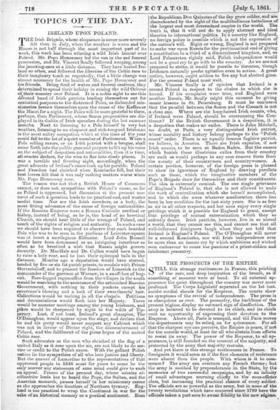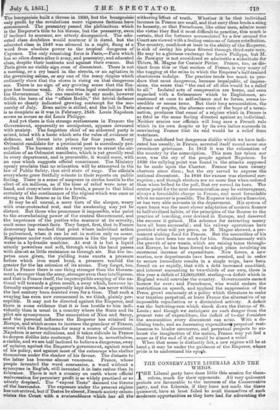THE PROSPECTS OF THE EMPIRE.
STILL this strange restlessness in France, this pricking of the ears, and deep inspiration of the breath, as if something of moment were at hand. To all external ap- pearance the quiet throughout the country was never more profound. The Corps Legislatif separated on the let inst. amidst cordial shouts for the Emperor. The courts show no symptoms of the revival of independence. The press is as obsequious as ever. The peasantry, the backbone of the present regime, display no outward sign of disaffection. The army is believed -to be devoted to its chiefs, and its chiefs omit no opportunity of expressing their devotion to the Emperor. Above all, Paris is tranquil, and till Paris moves the departments may be relied, on for quiescence. For all that the sharpest eye can perceive, the Empire is peace, if not for the outside world, at least for all who abstain from efforts to resist its sway. The power of the Emperor, to all ap- pearance, is still founded on the consent of the majority, and protected by the army that majority recruits. And yet there is this strange restlessness in France. To foreigners it would seem as if the first elements of resistance were absent from the people. With whom is it to com- mence ? The army can overturn any French throne ; but the army is soothed by preponderance in the State, by the memories of two successful campaigns, and by an infinity of small advantages accruing chiefly to the sous-offither class, but increasing the practical chance of every soldier. The officials are as powerful as the army, but in none of the twenty revolutions which have occurred since 1789 have the officials taken a part save to swear fidelity to the new regime. 'The bourgeoisie built a throne in 1830, but the bourgeoisie only profit by the revolutions more vigorous factions have commenced. The peasantry passed the plebiscitum which is the Emperor's title to his throne, but the peasantry, even if inclined to murmur, are utterly disorganized. The edu- cated class doubtless would murmur if it dared, but the educated class in 1848 was silenced in a night, flung at a word from absolute power to the tropical dungeons of Cayenne. The only remaining force is Paris,—Paris which has so often drawn after it army, and peasantry, and educated class, despite their instincts and against their reason. But Paris gives no visible sign even of discontent. There is not a meeting, or a cry heard in the streets, or an agitation in the governing salons, or any one of the many ripples which ordinarily show that the storm is rising on that dangerous sea. There is no sign of any growing sense that the Em- pire has become weak. No one tries legal conclusions with the Government. No one emulates in any mode, however feeble, the hero of the " affaire Rodde," the trivial defiance which so clearly indicated growing contempt for the mo- narchy of July. Even satire is stilled, and the lull in Paris is as complete as it was in February, 1848. Louis Napoleon seems as secure as did Louis Philippe.
And yet there is this strange restlessness in France: the G-ovemment, apparently so omnipotent, appears devoured with anxiety. The forgotten chief of an abhorred party is seized, tried with a haste which sets the rules of evidence at defiance, and thrust into prison for four years. Every Orleanist candidate for a provincial post is mercilessly pro- scribed. The bureaux strain every nerve to arrest the cir- culation of an Orleanist manifesto, which is yet greedily read in every department, and is procurable, it would seem, with an ease which suggests official connivance. The Ministry openly proclaim that no relaxation will be attempted in the law of Public Safety, that civil state of siege. The officials everywhere grow fretfully minute in their reports on public feeling. There is a sense of suspense in circles hostile to the elect of six millions, as if the time of relief were near at hand, and everywhere there is a break, a pause in that blind certainty of the continuance of the regime which was once as strong on the Bourse as in the Elysee.
It may be all unreal, a mere turn of the sleeper, weary with over-protracted rest, and the awakening may yet be distant. But those who pronounce it impossible, who point to the overwhelming power of the central Government, and the impotence of the parties who murmur at its severity, emit some important facts. They forget, first, that in France democracy has reached that point where individual action is pulverized, when it can be set in motion only en muse. Reilistance under such circumstances is like the impetus of water in a hydraulic machine. At rest it is but a liquid utterly powerless and, soft, through which the hand passes with almost as little resistance as through air. But the im- petus once given, the yielding mass exerts a pressure before which iron must bend, a pressure tenfold the greater for the lax cohesion of its atoms. They forget, too, that in France there is one thing stronger than the Govern- ment, stronger than the army, stronger even than intelligence, and that is France itself, the imperceptible swaying of the na- tional will towards a given result, a sway which, however in- formally expressed or apparently kept down, has never within the last century been resisted even for a time. That such a swaying has even now commenced is, we think, plainly per- ceptible. It may not be directed against the Emperor, and there is some evidence that it is less hostile to him indi- vidually than is usual in a country where the State and its pilot are synonymous. The annexation of Nice and Savoy, and the personal influence the Emperor has attained in Europe, and which seems to increase the grandeur of France, atone with the Frenchman for many a source of discontent. Napoleon is never ridiculous, and it takes ridicule in France to deepen dislike into contempt. But there is, nevertheless, a visible, and we are half inclined to believe a dangerous, sway of opinion against the Emperor's government, against much of his policy, and against most of the entourage who shelter themselves under the shadow of his favour. The distaste to the latter has become almost venomous. France, whose people invented the word concussion, a word without a synonyms in English, still invented it in hate rather than in tolerance. There is not a country on earth where official rnalversation for pecuniary profit is so widely practised or so utterly despised. The "exposé Teste" damned the throne of the barricades. The exposure under the present regime has not arrived, but if Testes be absent, French society cilium- mates the Court with a vraisemblance which has all the withering effect of truth. Whether it be that individual incomes in France are small, and that envy thus lends a sting to honesty, or that Frenchmen, like other men, admire most the virtue they find it most difficult to practise, this much is certain, that the fortunes accumulated by a few around the Court are viewed with a feeling ominous of future retribution. The country, confident at least in the ability of the Emperor, is sick of seeing his plans filtered through third-rate men. He may be a glorious exchange for Louis Philippe, but M. de Persigny is not considered so admirable a substitute for niers, M. Magne for Casimir Perier. France, too, as dis- tinct from this or that section of France, is very weary of the tugging at the reins in which the Emperor'sgalf-trained charioteers indulge. The practice tends too much to pro- duce that most dangerous, because impalpable, of impres- sions the sense that "the end .of all this would be a relief to all." Isolated acts of compression are borne, and even regarded with a forbearance which to Englishmen, ac- customed at once to self-reliance and to forms, seems in- credible or seems tame. But their long accumulation, the absence of respite, the absence even of the hope of a termi- nation, produces that ennui of a regime which in France is as fatal as the same feeling directed against an individual. Neither armies nor officials will long save a French rule which in its own despite or by its own inches succeeds in convincing France that its end would be a relief from weariness.
That undefined but dangerous dislike which we have indi- cated has usually, in France, accreted itself round some one prominent grievance. In 1815 it was the exhaustion of the country by the conscription. This man has taken our sons, was the cry of the people against Napoleon. In 1830 the rallying point was found in the attacks supposed to be made upon the Charter. France has torn twenty charters since then ; but the cry served to express the national discontent. In 1848 the excuse was electoral cor- ruption; and though electors are no more free when ordered than when bribed to the poll, that cry served its turn. The centre point for the next demonstration may be extravagance, always a formidable charge in France, and most formidable when no answer is possible. The Emperor is either a financier, or has very able servants in the department. His system of open loans was the most clever adaptation of modern finance to half-civilized habits, of the principles of the Bourse to the practice of hoarding, ever devised in Europe, and deserved the success it gained. His schemes for extracting money have all been successful ; and his railway operations have provided what will yet prove, as M. Magne showed, a per- manent sinking fund for France. But the necessities of his position have been too much for him. Simultaneously with the growth of new wants, which are raising taxes through- out Europe, he has been forced to adopt plans involving an enormous increase of expenditure. New forces, a new marine, new departments have been created, and in order to secure immediate results in a single reign' have been forced on so rapidly, that with a debt increased one-third, and interest amounting to two-thirds of our own, there is this year a deficit of 13,000,0001. sterling—a deficit which in England would convulse the country. Governments cannot borrow for ever ; and Frenchmen, who would endure the restrictions on speech, and applaud the suppression of the Press, growl ominously at a policy which threatens to make war taxation perpetual, or leave France the alternative of an impossible repudiation or a diminished activity. A deficit was the battering-ram which shook down the throne of St. Louis ; and though we anticipate no such danger from the present rate of expenditure, the deficit of to-day furnishes the ammunition every discontent can seize. With a de- clining trade, and an increasing expenditure. perpetual rest- lessness to hinder commerce, and perpetual projects to ex- haust the imagination of the nation, France may yet feel a sense as if the end of it all would be almost a relief.
When that sense is distinctly felt, a new regime will be at hand it may be under the guidance of the Emperor, whose pride is to understand his epoqh.































 Previous page
Previous page